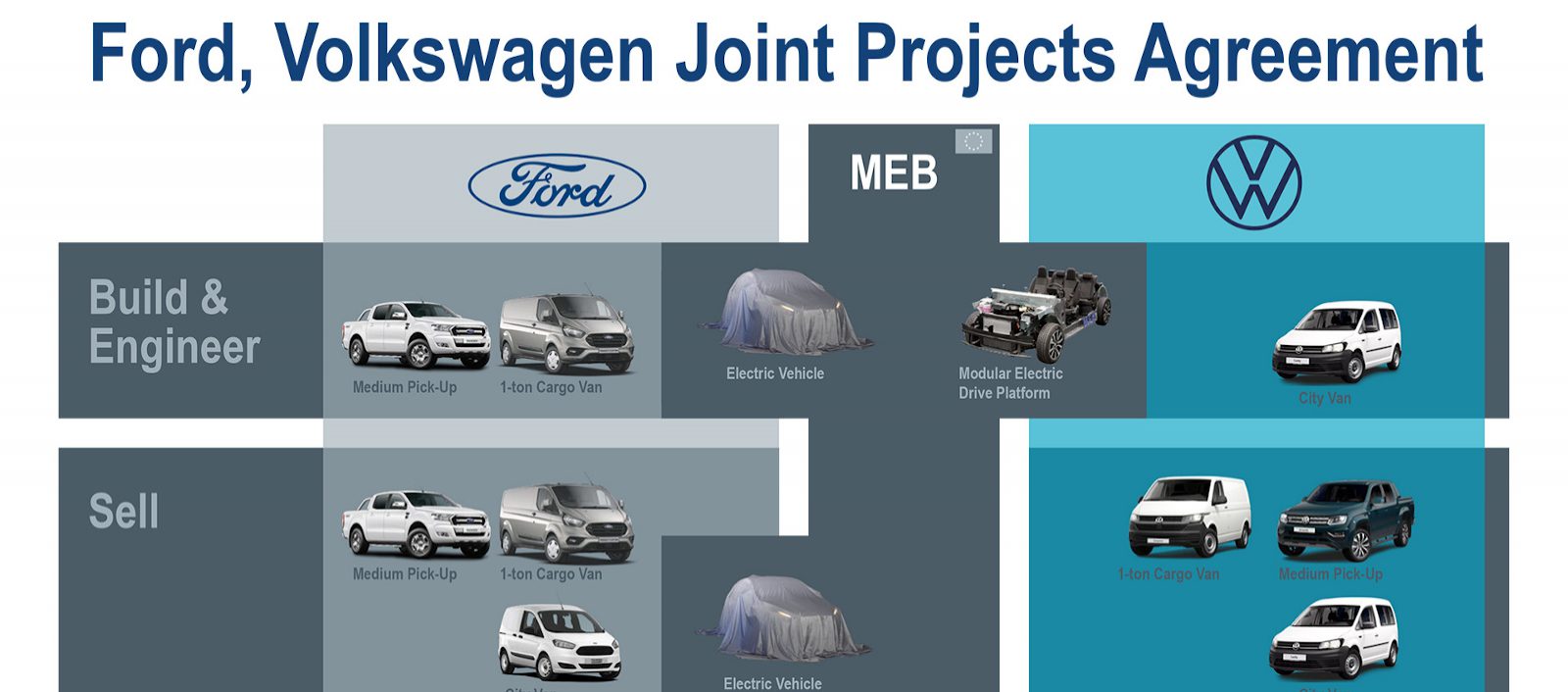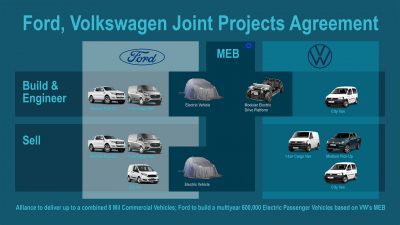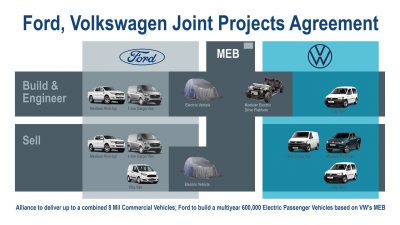- Samenwerking bij ontwikkeling bedrijfswagens; lichte bestelauto gemaakt en gebouwd door Volkswagen, bestelauto van 1 ton ontworpen door Ford. Medium Volkswagen pick-up gebouwd op Ford Ranger-platform - vanaf 2022
- Gedurende de levenscyclus van deze drie producten, verwachten de bedrijven samen tot 8 miljoen van deze bedrijfswagens te produceren
- Ford start vanaf 2023 met de bouw van een nieuwe elektrische auto voor Europa, op basis van Volkswagen's Modular Electric Drive platform. Productie zou in meerdere jaren meer dan 600.000 eenheden kunnen bereiken
- Ford en Volkswagen zullen samenwerken met Argo AI om onafhankelijk autonome voertuigen te ontwikkelen op basis van de innovatieve zelfrijdende technologie van Argo AI
- Samenwerking omvat geen ‘cross-ownership’ tussen de twee bedrijven. Naar verwachting zal het voor beide bedrijven aanzienlijke efficiëntieverbeteringen opleveren
Ford en Volkswagen hebben vandaag een overeenkomst getekend waarin ze hun wereldwijde alliantie uitbreiden. Door de krachten te bundelen kunnen beide bedrijven voldoen aan de snel veranderende behoefte van klanten op het gebied van midsize pick-ups, bedrijfswagens en elektrische voertuigen in Europa en andere regio’s. Lees verder
Downloads
Plannen voor de samenwerking zijn vorig jaar juli al door Ford en Volkswagen aangekondigd.
Lees het bericht hieronder verder in het Engels:
The companies expect the alliance to enhance ownership experiences for current and future customers by more rapidly innovating vehicle offerings, incorporating relevant new technologies, delivering better utility and offering more model choices. They anticipate continued growth in global industry demand for commercial vehicles and for high-performing electric vehicles to add valuable scale to their individual product portfolios.
The alliance will:
- Produce a medium pickup truck engineered and built by Ford, for sale by Volkswagen as the Amarok starting in 2022 within the Volkswagen Commercial Vehicles lineup
- Further strengthen the commercial-vehicles businesses of both companies as early as 2021 – with a city delivery van based on the latest Caddy model, developed and built by Volkswagen Commercial Vehicles and later a 1-ton cargo van created by Ford, and
- Lead to a highly differentiated Ford electric vehicle for Europe by 2023 built on Volkswagen’s Modular Electric Drive, or MEB, toolkit, expanding on Ford’s zero-emission capabilities in the region
During the lifecycles of the products, the companies expect to produce up to a combined 8 million of the medium pickup truck and both commercial vans included in the commercial relationships.
“In light of the Covid 19 pandemic and its impacts on the global economy, more than ever it is vital to set up resilient alliances between strong companies,” said Volkswagen Group CEO Dr. Herbert Diess. “This collaboration will efficiently drive down development costs, allowing broader global distribution of electric and commercial vehicles, and enhance the positions of both companies.”
“This alliance comes at a time of tremendous enthusiasm about the intersection of increasingly intelligent, connected vehicles in an ever-smarter world,” said Ford CEO Jim Hackett. “This creates a huge opportunity to innovate and solve many of the world’s transportation challenges and deliver extraordinary benefits to customers – even as companies need to be selective about how they use their cash.”
Ford and Volkswagen both have strong commercial van and pickup businesses around the world, including popular models such as Ford’s Transit and Ranger and Volkswagen Commercial Vehicle’s Transporter, Crafter, Caddy and Amarok.
“Commercial vehicles are fundamental to Ford today and an area where we will accelerate and grow, and working with Volkswagen on these platforms will provide both of us significant financial advantages in things like engineering, and plants and tooling,” said Jim Farley, Ford chief operating officer. “Separately, Ford will add battery electric versions of Transit and F-150 in the next 24 months for commercial customers who increasingly need zero emissions and the power of connectivity, data and artificial intelligence.”
“The collaboration with Ford is a key building block of our GRIP 2025+ strategy and part of the current transformation of Volkswagen Commercial Vehicles,” said Thomas Sedran, chairman of the board of management of Volkswagen Commercial Vehicles. “This long-term cooperation with Ford will strengthen our very good position in area of light commercial vehicles, especially in our core European markets, and is proof that we are successfully implementing our plan step by step.”
Ford’s use of Volkswagen’s MEB architecture in Europe will represent another cornerstone in Volkswagen’s electric vehicle strategy, and further efforts by both companies to fulfill their commitments to the Paris 2015 Agreement. Volkswagen and Ford plan to explore additional ways to cooperate on electric vehicles.
Over several years starting in 2023, Ford could deliver 600,000 electric vehicles atop the MEB architecture, which is designed to combine space and performance with electric drive. The vehicle, which will be designed and engineered by Ford in Cologne-Merkenich, will add another compelling nameplate to its own all-electric Mustang Mach-E, which will be introduced in 2021.
Additionally, the companies will both work with Argo AI to form distinct, highly capable autonomous-vehicle businesses based on Argo AI’s self-driving technology. Last week, Volkswagen closed its previously announced investment in Argo AI, the Pittsburgh-based company in which Ford already had ownership and development interests.
Volkswagen and Ford independently choosing to invest in Argo AI illustrates the technical leadership and progress of Argo AI’s self-driving system, and how alliances can help enable development of breakthrough technologies that require substantial time and resources. Argo AI’s SDS is the first with commercial deployment plans for both Europe and the U.S. The global reach of Ford and Volkswagen will give Argo AI’s platform the largest geographic deployment potential of any autonomous driving technology to date. Reach and scale are important factors in developing an SDS that is robust and cost efficient.
The Volkswagen/Ford alliance does not include cross-ownership between the companies, which will remain competitors in the marketplace.




